|
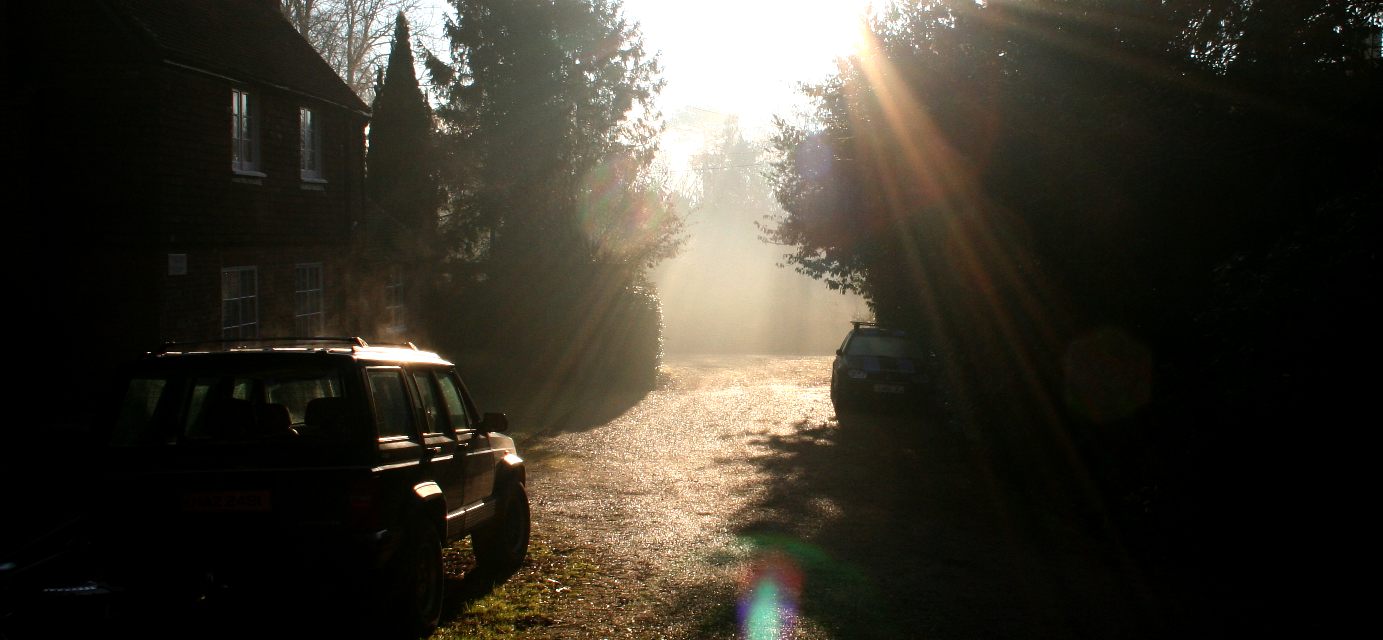
MISTY
MORNING SUNRISE - We see sights like this every day, natural beauty
surrounds us and we take it for granted. We would know when something is
wrong because we could see it. But we cannot see below the surface of the
waves and something is dreadfully wrong under our oceans. This is a
picture of The Old Rectory, Lime Park in Sussex, England, early one winter morning. The
picture at the foot of this page is looking from Lime Park across the
South Downs to Eastbourne (famous for its pier)
with a farmer calling his cows in to water as the sun sets. Copyright © 24
January 2017 Blueplanet Universal Holdings Ltd. All rights reserved. You
will need the permission of BUH to use this photograph except for private
research or educational
purposes.
WHY
SKY ?
According
to their website Sky want to use their voice as one of Europe’s leading Entertainment
Companies and the potential of their reach to inspire people to take action to protect our
planet.
They choose big, global issues that matter to our customers and to inspire people to make a real difference.
They want to bring to life our amazing ocean for millions of people across
Europe.
They want to bring the issues of ocean health to life and discuss the solutions. Sky News
aim take the lead by airing a special one hour documentary showing how plastics are affecting our oceans. Through the campaign we will explore the different ways people can help to make a difference and will aim to inspire people to take action.
They are doing their bit at Sky too, looking at everything we do that impacts the Oceans, from designing
their products with less material, to ensuring that their products are recycled. Removing all single-use plastics is a significant step
they are looking to take. They've made a good start by removing all plastic
water bottles,
plastic cups, straws, and
their cutlery is made from corn-starch. This is just the beginning of the changes -
they are up for the challenge and will do more, including looking at their
supply chain and the products they make.
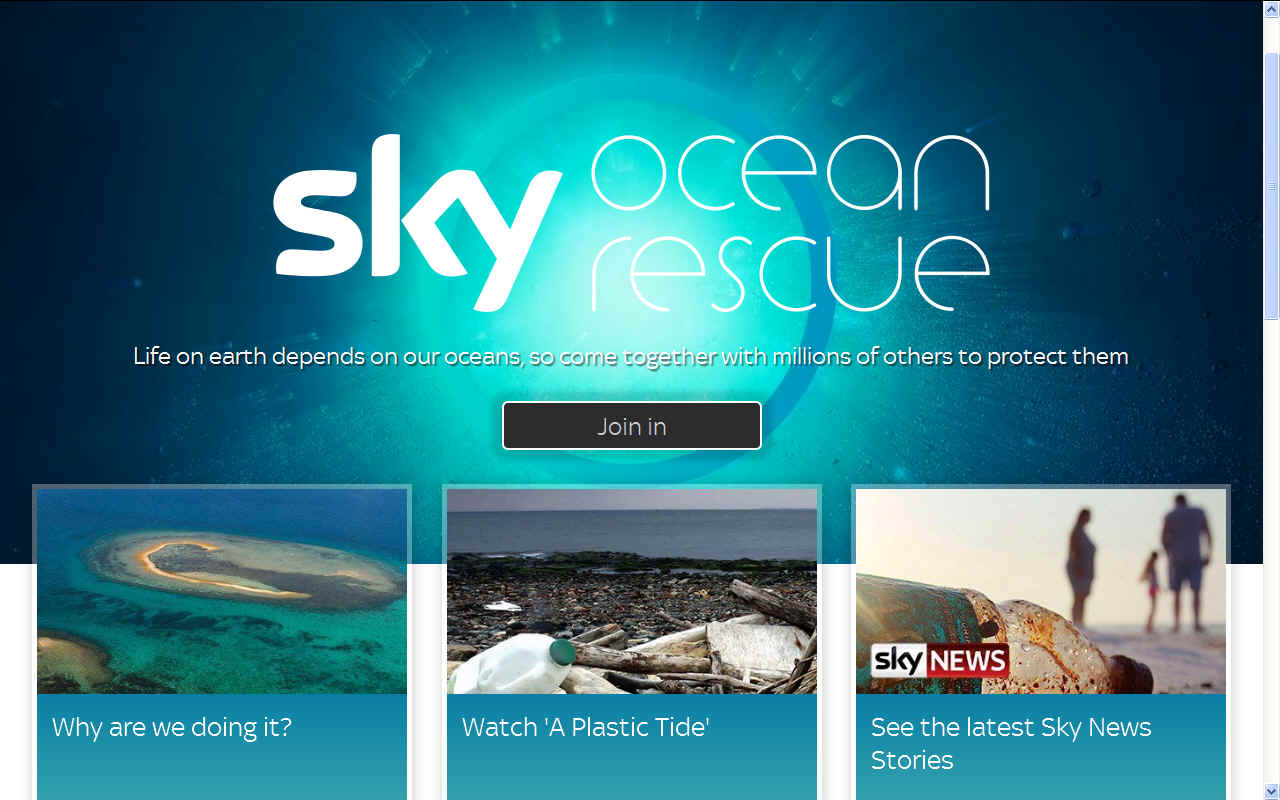
SKY
NEWS
The Prince of Wales has given his backing to the Sky Ocean Rescue campaign, describing the build-up of
plastic waste in our oceans as "one of the most troubling environmental trends".
Speaking in the Morning Room at Clarence House, Prince Charles said: "One of the most troubling environmental trends, as I see it at least, is the progressive build-up of plastic waste in the oceans.
"Eighty percent of it is coming from the land as everyday products such as plastic bags, straws and bottles as they travel along rivers to the sea and then finish up being spread right around the world to end up even on the most remote stretches of oceans, farthest-flung beaches on Earth and the deepest parts of the ocean."
Speaking in support of the Sky campaign, he added: "All I can say is Sky's ocean plastics campaign will hopefully create further awareness of this incredibly serious issue."
For over 40 years, the heir to the throne has been a leading voice on environmental issues - at times facing criticism for his involvement at the forefront of the climate change debate.
In 2010, he set up his International Sustainability Unit to help facilitate discussion between governments, businesses and key individuals.
Talking about the impact that plastic waste is having on marine species, the Prince said:
"Some of that plastic is being swallowed by sea birds, by whales, dolphins, seals and other creatures to the point today where plastic waste is estimated to be in the guts of about half of all marine mammals."
He continued: "I also find it sobering to think that almost all the plastic ever produced is still here somewhere, on the planet in one form or another, and will remain here for centuries to come - possibly thousands of years."
The Prince also believes we should learn from other European countries where people are given incentives to recycle single-use plastics.
Citing Sweden, Belgium and Germany as examples, he said: "They have a deposit scheme for plastic bottles using reverse vending machines which suck your bottle in when you put it into the machine.
"When they introduced this to Germany, the rubbish problem reduced by 95%.
"It almost seems to me extraordinary that we don't look more closely at these sorts of initiatives which could make such a dramatic difference."
Next week, two of the Prince's charities - the International Sustainability Unit and Business in the Community - will hold meetings in
London with a number of high-profile businesses to look at how companies can help reduce the amount of plastic in the supply chain, and come up with creative solutions to make sure less ends up in our oceans and waterways.
By Rhiannon Mills - Royal Correspondent

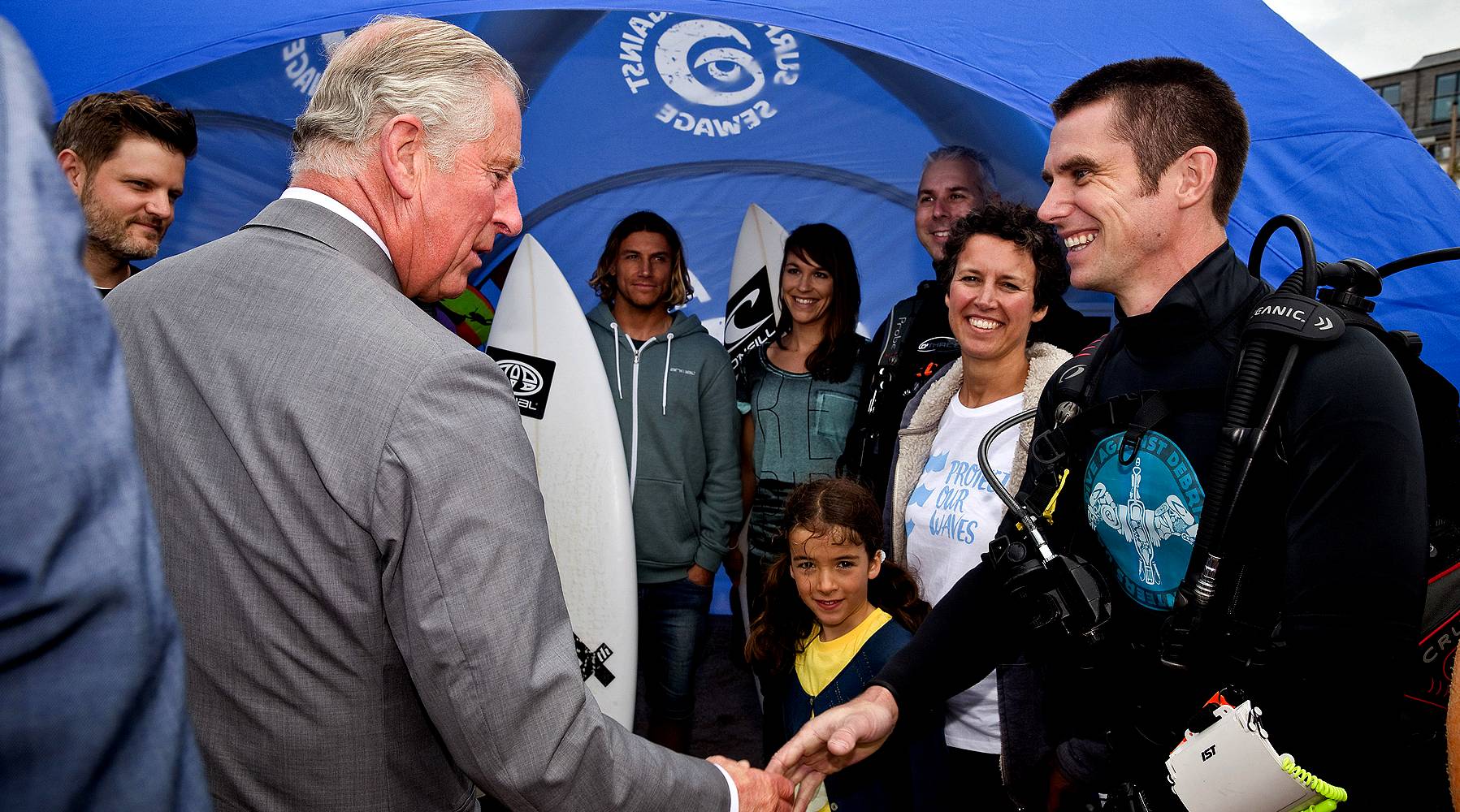
OCEAN
AWARENESS - Prince Charles was a sub aqua diver and once dived on the Mary
Rose, the flagship of Henry VIII. Plastic is not all that man is
dumping in the oceans. For years we have been fighting each other and
sinking ships in the oceans, some of which, mainly submarines,
are radio active.





OTHER
POLLUTION - The Mary Rose is a carrack-type warship of the English Tudor navy of King
Henry VIII. After serving for 33 years in several wars against France, Scotland, and Brittany and after
a substantially refit in 1536 that proved to be her undoing, she saw her last action on
the 19th of July 1545. While leading the attack on the galleys of a French invasion fleet, she capsized in the Solent, north of the
Isle of
Wight. The wreck of the Mary Rose was rediscovered in 1971 and raised in
1982, then preserved in The Mary Rose Museum located at the Historical Dockyards in
Portsmouth in the
UK, now run by the Mary Rose Trust. On very rare occasions we clean up the
mess we have made, in this case 437 years later.
THE TELEGRAPH 24 JANUARY 2017
Seafood eaters ingest up to 11,000 tiny pieces of plastic every year with dozens of particles becoming embedded in tissues, scientists have warned, in findings described as 'sobering' by the Prince of Wales.
Researchers from the University of Ghent in Belgium believe that microplastics accumulate in the body over time and could be a long term health risk.
And they say the amount of plastic absorbed will only get worse as pollution in the oceans increases, a finding described by the Prince of Wales as ‘sobering.’ The Prince has previously described micro-particles as 'grey goo.'
Dr Colin Janssen, who led the research, said the presence of plastic particles in the body was ‘a concern’.
"Now we've established that they do enter our body and can stay there for quite a while, we do need to know the fate of the plastics,” he told Sky News to coincide with the launch of Sky’s new environmental
campaign Sky Ocean Rescue.
“Where do they go? Are they encapsulated by tissue and forgotten about by the body, or are they causing inflammation or doing other things?
“Are chemicals leaching out of these plastics and then causing toxicity? We don't know and actually we do need to know.”
The study is the first comprehensive risk assessment of its kind. Scientists calculated that more than 99 per cent of the microplastics pass through the
human body - but the rest are taken up by body tissues.
Mussels feed by filtering around 20 litres of seawater a day, ingesting microplastics by accident.
Most are excreted, but on average each mussel contains one tiny fragment lodged in its body tissue. As plastic pollution builds up in the ocean that will increase.
If current trends continue, by the end of the century people who regularly eat seafood could be consuming 780,000 pieces of plastic a year, absorbing 4,000 of them from their digestive systems.
The Prince of Wales said: “I find it sobering to think that almost all the plastic ever produced is still here somewhere on the planet in one form or another and will remain here for centuries to come, possibly thousands of years.”
There are more than five trillion pieces of microplastic in the world's oceans and the equivalent of one rubbish truck of plastic waste is being added to the sea every minute.
By 2050 that will increase to four trucks every minute. The plastic in the ocean will take decades or even centuries to break down into small pieces, but many scientists believe it will never completely disappear.
Dr Janssen added: "The next generation or two generations might say they left us a rotten plastic legacy because now we are suffering in various ways from that legacy.
“We have to do something about it."
Sky Ocean Rescue launches today with the campaign, initially led by Sky News, aiming to educate and inspire people to change their behaviour to help protect our oceans and dramatically reduce the amount of plastic waste produced every day that end up in them.
Visit the campaign's website at www.skyoceanrescue.com to discover the scale of the damage caused by plastic disposed in
oceans. A Plastic Tide was broadcast on Sky Atlantic at 8pm on Tuesday January 24th
and on Sky News at 8pm on Wednesday January 25th 2017.
By Sarah Knapton, Science Editor



DAILY MAIL APRIL 2016 - A once-proud
minesweeper which Prince Charles captained during his Royal Navy career is now lying half-submerged in a Merseyside dock.
Once a bastion of British maritime history, HMS Bronington is docked in Birkenhead, but has sunk at its stern, leaving it resting on the bottom of the dock.
The Prince of Wales captained the ship for 10 months from February 9, 1976 and was said to be 'a popular skipper' who 'got on with everyone'.
HMS Bronington has been in Gillbrook Basin for some two years since the closure of the Warships Preservation Trust, which took ownership of it in 2002.
The world-class naval warship, which was launched in 1953, has since fallen into disrepair - and at one stage even had a tree growing out of it.
According to local ship expert Phil Owen, the decking of the ship is in bad condition and she has a history of letting in rainwater.
After its Navy service, the ship was bought by The Bronington Trust, a registered charity with the Prince as its patron, and he later visited his old command.
The Prince has been approached several times by interested parties to help save the vessel, according to Mr Owen.
He said: 'If he was to turn around and say 'I will save my ship' then everyone would come out of the woodwork.
'She could be used for so much more. The ship is quite unique. Restoring her would be an experience for apprentices and navy personnel.
'She could be the centre of something bigger.'
Mr Owen added that Prince Charles was thought of as a good captain by his crew on the Bronington, saying: 'I have yet to see anyone have a bad word
about him, everyone got on with him.'
The Prince ended his service aboard the Bronington by being wheeled off it in a wheelchair 'because his command had aged him' and, in a bizarre naval tradition, with a toilet seat hanging around his neck.
Mr Owen monitors much of the shipping in the Mersey on his blog and had been keeping an eye on the 440-tonne 'Bronnie' - one of the last Ton Class minesweepers left in the world.
A spokesman for Peel Ports said: 'Peel Ports assumed responsibility in 2006 when the previous owner went into administration and since then have worked to secure the vessel's future by seeking to transfer ownership to credible interested parties, without success.
'During that time, we regularly pumped water out of the vessel until she became unsafe to access and have since continued to maintain her moorings.'


PRINCE
CHARLES - is Admiral of the Fleet, Field Marshal and Marshal of the Royal Air Force.
He began his career in the Armed Services in March 1971, when he started a four-month attachment with the Royal Air Force at Cranwell, Lincolnshire.
The Prince had already gained his private pilot's licence, when he began advanced training to qualify as a jet pilot.
Flight Lieutenant The Prince of Wales was awarded his RAF wings at Cranwell on August 20, 1971.
On September 15, The Prince joined the Royal Naval College, Dartmouth, under the graduate entry scheme, as Acting Sub-Lieutenant. The Duke of Edinburgh, and his great-uncle, Lord Mountbatten, had both been at Dartmouth.
During the next two and a half years, The Prince attended a four-month course at Portsmouth and served on four more ships. In 1973, he was promoted to Acting Lieutenant.
Following a lieutenant's course at the Royal Naval College, Greenwich, The Prince was given command of his own ship, the minehunter HMS Bronington, for the final ten months of his active service in the Royal Navy ending on December 15, 1976.
The following January he was promoted to the rank of Commander. He was promoted again on his 40th birthday in 1988, to Captain in the Royal Navy and Group Captain in the
Royal Air
Force.
On November 14, 1998, the Ministry of Defence announced that The Prince of Wales had been promoted to '2-star' Rank in all three Services of the Armed Forces to coincide with his 50th birthday.
His Royal Highness was again promoted in all three Services on his 54th birthday in 2002 becoming Vice-Admiral in the Royal Navy, Air Marshal in the Royal Air Force and Lieutenant General in the Army.
In 2006, The Prince was promoted to Admiral in the Royal Navy, General in the Army and Air Chief Marshal in the Royal Air Force.
Joining The Royal Navy, Prince Charles followed in the footsteps of his father, The
Duke of
Edinburgh, grandfather, King George VI and two great-grandfathers. By Amie Gordon

KLFM 967 24th January 2017
The Prince of Wales has given his backing to the Sky Ocean Rescue campaign, describing the build-up of plastic waste in our oceans as "one of the most troubling environmental trends".
Speaking in the Morning Room at Clarence House, Prince Charles said: "One of the most troubling environmental trends, as I see it at least, is the progressive build-up of plastic waste in the oceans.
"Eighty percent of it is coming from the land as everyday products such as plastic bags, straws and bottles as they travel along rivers to the sea and then finish up being spread right around the world to end up even on the most remote stretches of oceans, farthest-flung beaches on Earth and the deepest parts of the ocean."
Speaking in support of the Sky campaign, he added: "All I can say is Sky's ocean plastics campaign will hopefully create further awareness of this incredibly serious issue."
For over 40 years, the heir to the throne has been a leading voice on environmental issues - at times facing criticism for his involvement at the forefront of the
climate change debate.
In 2010, he set up his International Sustainability Unit to help facilitate discussion between governments, businesses and key individuals.
Talking about the impact that plastic waste is having on marine species, the Prince said: "Some of that plastic is being swallowed by sea birds, by whales, dolphins, seals and other creatures to the point today where plastic waste is estimated to be in the guts of about half of all marine mammals."
He continued: "I also find it sobering to think that almost all the plastic ever produced is still here somewhere, on the planet in one form or another, and will remain here for centuries to come - possibly thousands of years."
The Prince also believes we should learn from other European countries where people are given incentives to recycle single-use plastics.
Citing Sweden, Belgium and Germany as examples, he said: "They have a deposit scheme for plastic bottles using reverse vending machines which suck your bottle in when you put it into the machine.
"When they introduced this to Germany, the rubbish problem reduced by 95%.
"It almost seems to me extraordinary that we don't look more closely at these sorts of initiatives which could make such a dramatic difference."
Next week, two of the Prince's charities - the International Sustainability Unit and Business in the Community - will hold meetings in London with a number of high-profile businesses to look at how companies can help reduce the amount of plastic in the supply chain, and come up with creative solutions to make sure less ends up in our oceans and waterways.

CLARENCE
HOUSE - DAILY MAIL 16 December 2016 - It looks like a shot from the Oscar winning film The King’s Speech.
But this is the late monarch’s grandson, the Prince of Wales, as he records what can only be called ‘The Prince’s Speech’, sat at his favourite desk in his London home, Clarence House.
The movie, starring Colin Firth in the title role, was about King George VI being carefully coached to overcome his lifelong stammer so he could address the nation over the new-fangled wireless
But Prince Charles’ was very much required to be naturally skilled with words for the performance pictured here.
For he was recording a special message to celebrate the upcoming 50th anniversary of much-loved
BBC Radio 4 comedy show, Just A Minute.
In the long-running show contestants, usually famous entertainers, are required to speak for as long as possible, ideally a whole minute, ‘without hesitation, repetition or deviation’.
They are interrupted and lose their turn if they break those rules.
Whether the Prince completes his speech – which is delivered in the style of the show - according to the rules if the game is not yet revealed.
It will have been a struggle, as he actually talks for two minutes.
But the BBC said yesterday that the Prince describes the programme as ‘one of this country’s great institutions’, as he opens a special festive episode broadcasting on Christmas Day.
Entitled Just a Minute Does Panto!, it will be hosted as always by Nicholas Parsons, who has been the voice of the comedy game show since it launched in December 1967.
Having already heard the special royal tribute, Parsons, 93, said: ‘It was a pleasure to hear The Prince of Wales recount years of listening to Just a Minute with such fondness.
‘But when he delivers his message will he make it to the end without hesitation, repetition or deviation? You’ll find out on
Christmas
Day.’
KLFM 96.7 24 JANUARY 2017
Sir Richard Branson has told Sky News he finds it "astonishing" that President
Donald Trump wants to roll back measures to protect the environment which were brought in by his predecessors.
The billionaire and green ambassador was talking to Dermot Murnaghan as part of Sky's Ocean Rescue campaign to reduce plastic waste.
Sir Richard said, in the absence of leadership from the White House on the threats of pollution and
climate
change, "business leaders are going to have to step in and work with the public in doing what we believe to be right".
He also backed Sky's campaign to introduce a deposit scheme for single use
plastic
bottles, which is fiercely resisted by the soft drinks industry.
The Government has trialled such a scheme in Scotland and is now mulling a national roll-out as part of its consultation into extending a ban on microbeads.
The Virgin founder said: "It's not just the people who use the bottles who will take them back: if someone is foolish enough to leave a plastic bottle lying around, kids will make some money on the side from it.
"So I think it is a fantastic idea and one that should be encouraged."
Environment Secretary Andrea Leadsom has also backed the Sky campaign, and said the Government's consultation will look not just at banning microbeads in household products but reducing other plastic waste.
She told Sky News: "My personal commitment and this Government's commitment is to be the first generation that leaves our environment in a better place than we found it so that absolutely includes looking more at what else we can do."
When asked why the UK's recycling rate lags behind Belgium, the
Netherlands and Germany she said: "Coming from a low start we've massively increased the amount of household recycling, waste reduction, the amounts going to landfill and so on."
Committing to a new long term litter strategy to make dropping rubbish "as socially unacceptable as drink driving," she told Sky News: "Of course there's a lot more we can do, and our ambition is high and the action we are taking is very strong."
But Labour's shadow environment secretary Rachael Maskell said the Conservatives cannot be trusted on the environment.
She said: "We saw the scrapping of the Department of Energy and
Climate
Change, where we have seen (the issue) moved off the agenda.
"A promised 25 year plan hasn't emerged, and we were then promised a five-year framework by the end of last year. Again: no sign of it."
However, some British environmentalists are encouraged by Theresa
May's recent support for Government action to affect behaviour.
The 5p plastic bag tax produced an 85% drop in their use and there is hope among green groups that the consultation and litter strategy will promote state intervention.
[Note: Where is this money going?]
But the UK is struggling to meet an EU recycling target of 50% of household waste by 2020. Currently the country ranks about 10th out of 28 member states.
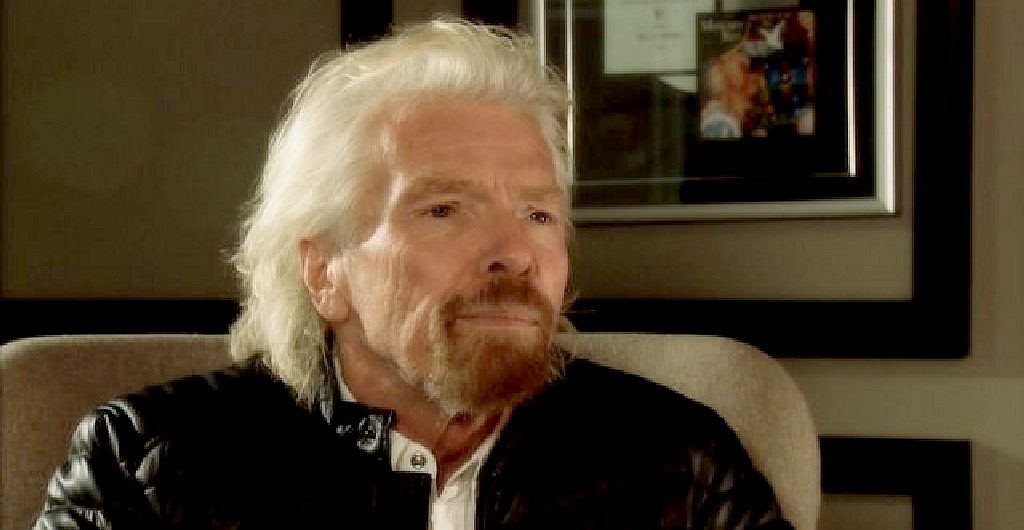
CONCERNED
OCEAN ELDER - Sir Richard Branson has long been interested in ocean
affairs and conservation issues as the chairman of the Virgin
group, one of which companies produces a cola that is (or was) sold in PET
plastic bottles. He would be the first to point this out to you, and we
are sure is trying to think of ways to change. Nice one Dickie.
PLASTIC SOUP FOUNDATION
- Prince Charles calls for end of dumping of plastic in the ocean
In 2012 the authoritative independent think tank Global Ocean Commission called for stringent measures to combat plastic
soup, none of which considered dealing with plastic in the ocean - that
part of the equation they decided not to look at.
The Global Ocean Commission, co-chaired by UK’s former Minister of Foreign Affairs
David Milliband, helped organise a conference in Washington where Prince Charles gave a
passionate speech about the threats of plastic as a consequence of our consumer society and called for everyone to take responsibility.
The Prince of Wales referred among others to a recent study that estimates that by 2025 there will be one ton of plastic for every three tonnes of fish in the sea.
Since then another study involving Dame
Ellen MacArthur has taken projections to 2050.
Van Hallstraat 52-1
1051 HH Amsterdam
The Netherlands
Tel: +31 (0)85 401 6244
Email: press@plasticsoupfoundation.org
VAT: NL 850288885 B01

FATHOMS FREE - Ocean Plastics Awareness Day - 22/07/2015
The Ocean Plastics Awareness Day was a ground-breaking initiative, which is sure to have put Cornwall at the forefront of Marine Conservation in the UK. Hosted by
Surfers Against Sewage and the Marine Conservation Society, it gave organisations the opportunity to commit to exploring pilot schemes which stem the flow of plastics into the ocean and reuse those removed from the sea. The event launched the Statement of Intent, signed by all participants, as a pledge to explore ways in which we can develop circular economy projects. The Prince of Wales’s International Sustainability Unit, has focused upon similar conversations about marine plastic waste and the circular economy, at a global level.
We were really excited to have been invited to join Surfers Against Sewage in their tent and grateful to them for giving us the occasion to speak on behalf of the diving community. Their team are always a joy to work with and are keen to represent the full spectrum of water users. They did this by encouraging the individual groups to display their own unique and fascinating interpretation of the marine debris problem and gave them the opportunity to share their experiences and ideas with Their Royal Highnesses. As divers, we see a different perspective than most; predominantly others see what has been washed ashore, whereas we see what is trapped underwater. Our display consisted of the most commonly found objects from our debris dives and the various methods we use for retrieving them. To add authenticity our three attendees, Lizi Dave and myself, were wearing full dive kit. Standing around in full kit for nearly two hours is not to be recommended. However, it had the desired effect and drew a lot of attention, including that of Charles and Camilla.
HRH The Prince of Wales has long taken an interest in the health of the marine environment and the need to address waste. He was a keen diver and President of the
British Sub Aqua Club for four decades, before passing it down to his son, The Duke of Cambridge, HRH Prince William. The Duke previously stated in an interview, “Scuba diving really has opened my eyes not only to many extraordinary sights, but also to the responsibilities that we have as guardians of the underwater world. Which is why, as BSAC’s new President, I hope to continue my father’s legacy of striving to preserve and protect our precious marine heritage and environment for future generations.” As you can imagine, it was a great honour to represent the diving communities’ interest in the marine litter crisis to Their Royal Highnesses. The Prince of Wales commented on how he had seen the debris problems himself first-hand, whilst diving and was pleased to see that we were doing our bit to help resolve the problem.
Shortly after HRH Prince Charles had passed on his way and we were left feeling overwhelmed at the great honor that had just been bestowed upon us, we were offered the privilege of an audience with
Camilla, the Duchess of Cornwall. HRH seemed equally as enthused and intrigued by our work. Especially at the fact that we are an organisation made up purely of volunteers and that, although from various backgrounds, our common interest had bound us together. I mentioned how our work is only a small part of the global effort by divers, operating through initiatives such as Project Aware’s Dive Against Debris programme. We discussed how they gather data from us and use it for their global campaigns. The Duchess was curious as to how we became established; I recalled how, after I organised my first
Dive Against Debris event, it received so much enthusiasm from its participants, that it gathered its own momentum and evolved from there.
Dive Against Debris Volunteers’ UK mission is to bring to the public eye the huge quantities of plastics that sink, ensuring they are no longer out of sight and mind. Both in the sea and washed ashore, marine debris poses more than just an unsightly picture, it is a real threat to marine life. The figures are astounding; 8 million tons of plastic enter the sea every year, as a result 100,000 sea creatures and a million
sea birds die annually, either by entanglement or ingestion. When you see the incredible amount of plastics being collected by such a large number of dedicated beach clean volunteers, it makes you shudder to think that this is just the tip of the iceberg; 70% sinks and is hidden underneath.
Dive Against Debris, surveys, catalogues and removes marine debris from under the sea. As is probably clear from the figures, what we can do alone is never going to be enough to resolve the issue. With a problem as diverse as the marine debris crisis, a multifaceted approach must be adopted. Which is why events like this are so vitally important; by pulling together an array of interested parties, a massive step forward was taken in creating such an approach. To have Their Royal Highnesses attending, was more than any of us could have wished for. As you would expect on such an occasion, energies were high, however this was not purely down to the Royal visit. It was also due to being surrounded by so many likeminded others who, being in their own niche, have been travelling upon parallel paths for too long. I can honestly say, it was a real privilege to be surrounded by such diverse and inspiring company. Personally, I have been left feeling optimistic as to what may come as a result of the Ocean Plastics Awareness Day.
Blog by Rob Thompson
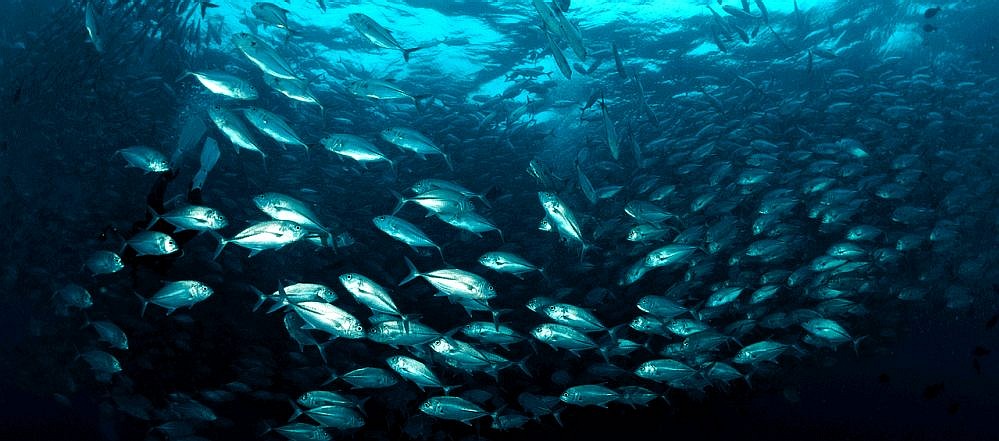
PLASTIC
SEAS - While the coral below is being bleached by changing ocean
chemistry, marine life now has to cope with micro plastic particles,
fishing nets and other manmade pollution. It's a brave new world where the
industrialist mankind is free to plunder and destroy our natural resources
for profit. Fortunately, some responsible corporations have a conscience
and are trying to do something about our dwindling wild fish
stocks.
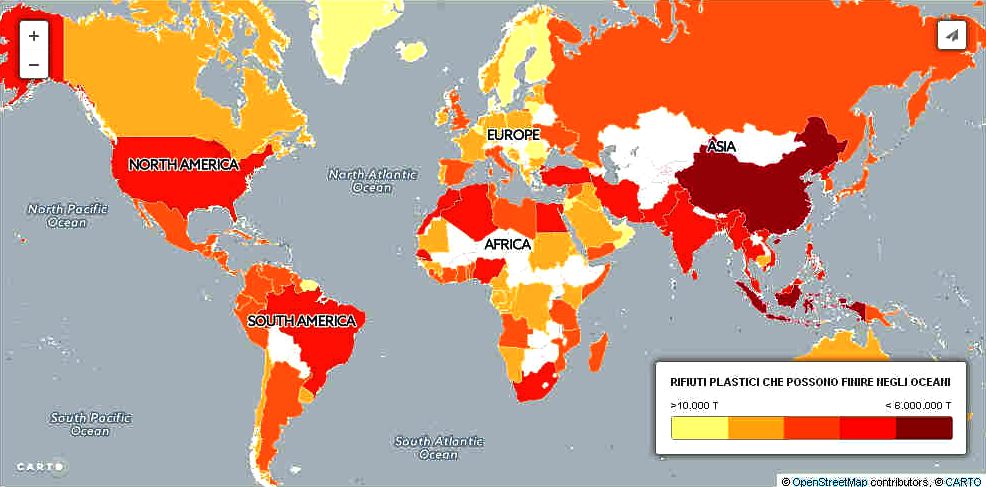
PLASTIC
OCEANS - It is estimated that by 2050,
there will be more plastic in our oceans than fish.

Plastica, ecco chi inquina di più gli oceani. MAPPE
Uno
studio pubblicato sulla rivista Science nel 2015, su dati del 2010, ha
provato a stimare il contributo di 192 nazioni del globo all’inquinamento dei mari con sostanze plastiche. La ricerca tiene
conto di fattori come la popolazione che vive a meno di 50 km dalle coste, la produzione di rifiuti e la capacità di smaltimento di
questi. NB: per i Paesi rappresentati in bianco non ci sono
dati - LO
SPECIALE.

MORE
SKY SITES
Sky.com
My Sky Join
Sky Now TV Sky
Academy Sky Rainforest Rescue
Sky Media
LINKS
& REFERENCE
http://tg24.sky.it/tg24/ambiente/sky-un-mare-da-salvare.html
https://skyoceanrescue.com/why-are-we-doing-it.html
http://tg24.sky.it/tg24//ambiente/mappe/2017/01/24/un-mare-da-salvare-paesi-inquinamento-oceani.html
https://skyoceanrescue.com/
http://www.telegraph.co.uk/science/2017/01/24/seafood-eaters-ingest-11000-tiny-pieces-plastic-every-year-study/ http://www.klfm967.co.uk/news/uk-news/2206562/prince-charles-hopes-for-sky-ocean-rescue-campaign/ http://www.plasticsoupfoundation.org/en/2015/03/prince-charles-calls-for-end-of-dumping-of-plastic-in-the-ocean/ http://www.dailymail.co.uk/news/article-4039128/The-future-King-s-speech-Prince-record-message-50th-anniversary-Radio-4-s-comedy-Just-Minute.html http://www.princeofwales.gov.uk/ http://www.princeofwales.gov.uk/ http://www.dailymail.co.uk/news/article-3557880/Minesweeper-captained-Prince-Charles-Royal-Navy-days-lies-half-submerged-Merseyside-dock.html http://www.dailymail.co.uk/news/article-4039128/The-future-King-s-speech-Prince-record-message-50th-anniversary-Radio-4-s-comedy-Just-Minute.html press@plasticsoupfoundation.org http://www.plasticsoupfoundation.org/en/2015/03/prince-charles-calls-for-end-of-dumping-of-plastic-in-the-ocean/ http://www.telegraph.co.uk/authors/sarah-knapton/ http://www.klfm967.co.uk/news/uk-news/2206562/prince-charles-hopes-for-sky-ocean-rescue-campaign/
http://www.telegraph.co.uk/science/2017/01/24/seafood-eaters-ingest-11000-tiny-pieces-plastic-every-year-study/
http://tg24.sky.it/tg24/ambiente/sky-un-mare-da-salvare.html
https://skyoceanrescue.com/why-are-we-doing-it.html
http://tg24.sky.it/tg24//ambiente/mappe/2017/01/24/un-mare-da-salvare-paesi-inquinamento-oceani.html
https://skyoceanrescue.com/
ACIDIFICATION
- ADRIATIC
- ARCTIC
- ATLANTIC
- BALTIC
- BAY
BENGAL - BERING
- CARIBBEAN
- CORAL
- EAST
CHINA SEA
ENGLISH
CH - GOC
- GULF
GUINEA - GULF
MEXICO - INDIAN
-
IOC
- IRC
- MEDITERRANEAN
- NORTH
SEA - PACIFIC
- PERSIAN
GULF - SEA
JAPAN - STH
CHINA - PLASTIC
- PLANKTON
- PLASTIC
OCEANS - SEA
LEVEL RISE - UNCLOS
- UNEP
WOC
- WWF

|




















